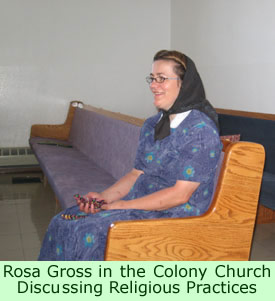“How can you say you love God if you don’t love your fellow man?” the Hutterite colony Business Manager asked us rhetorically. When Hutterites spout off in anger, he explained, they make it up afterwards. It shows their love for one another and their recognition that they must go on living together.
 Mike Gross, the Business Manager, or “Colony Boss,” carefully discussed the sensible practices that promote harmony at the Pincher Creek Hutterite Colony, located in a bucolic strip of southwestern Alberta prairie dominated by the Rocky Mountains (and some huge windmills) on the western horizon. He emphasized that people learn to work and play together at Pincher Creek, and when problems occur, as they do inevitably, people simply work things out. The colony requires people to forgive and to reconcile their problems.
Mike Gross, the Business Manager, or “Colony Boss,” carefully discussed the sensible practices that promote harmony at the Pincher Creek Hutterite Colony, located in a bucolic strip of southwestern Alberta prairie dominated by the Rocky Mountains (and some huge windmills) on the western horizon. He emphasized that people learn to work and play together at Pincher Creek, and when problems occur, as they do inevitably, people simply work things out. The colony requires people to forgive and to reconcile their problems.
Our conversations with Hutterites had begun five minutes earlier next to a large tour bus which was sitting in the yard of the farm complex. We had expected to find an out-of-the-way colony when we followed the directions along gravel roads several kilometers west of the small town of Pincher Creek. A tour bus? Was this the right place? Rosa Gross, Mike’s daughter, approached her two confused visitors with a big grin on her face.
Numerous German tours arrange to stop at the Pincher Creek Colony every year, she explained. They appreciate the fact that the Hutterites speak fluent German with them, and several of her colleagues were conducting the tour. She normally would be helping too, but she had set aside the afternoon for us.
As she took us inside to meet her dad, Rosa quickly cleared up some misimpressions about the Hutterites. For instance, many of the colonies have widely differing beliefs. It is difficult to generalize about them. The folks at Pincher Creek did not share the concerns of a neighboring colony near Coaldale about having their photos on their drivers licenses. She and the others in her group did not mind having their pictures taken.
After Mike made us feel at home in the kitchen of their apartment, he began explaining the cultural and social conditions at the colony. He emphasized that they had very good relations with the local “English” (their term for non-Hutterites). His daughter will be staffing a table for the colony in the nearby town this month when the community celebrates its centennial. The organizers of the celebration apparently invited the colony to participate, and Mike was happy to comply.
Talk turned to social problems that might occur in any large communal group. Yes, there are occasional difficulties with alcoholism, Mike admitted, but as with any medical problem, the colony seeks professional or medical assistance. They have one such issue now, and the individual is getting help from AA.
They also have occasional difficulties with mental illnesses, but they believe in getting the best medical help they can for such problems. Mike said that they normally do not expel people from the colony for problems—they solve them. In fact, they rarely excommunicate anyone, except in rare cases of adultery which they do not tolerate. They view excommunication as a temporary situation only.
As Mike prepared to leave on a trip, Rosa continued the tour of the rest of the colony. She explained that she helps her dad with the computer and the colony finances, but she also takes her turn with the other colony women in cooking, baking, gardening, cleaning, and laundry duties. When women turn 49, however, she said they do not have to continue working as hard, though they generally go on helping out as much as they can.
Rosa showed us the spotless institutional kitchen facilities and explained that members of the colony could eat in their own homes if they wished. But most of the people normally eat together, the women on the right and the men on the left. On Sunday nights, when people eat as families in their own homes, the men will frequently cook dinners for their families.
While we toured the farm buildings, Rosa discussed the quotas on milk and chickens that Alberta imposes on farming operations, and she mentioned that the authorities frequently come to inspect their operations—perhaps more often than neighboring farms that were probably not kept as clean.

Rosa says she loves the familiar songs they have memorized. The responsive style of the worship service—the minister reads a line and the congregation recites it back to him—has a lot of personal meaning.
But intellectual life is also important at the colony. Correspondence courses are quite popular, as is the public library in Pincher Creek. Rosa said she is an avid reader, borrows extensively from the library, and likes to keep up with what is going on in the world.
Asked about the numerous wind towers that punctuate the horizon, Rosa confirmed that they are on colony lands (they have 8,600 acres). She was aware of the controversy about them—the fact that some, especially in the forested mountains of the eastern U.S., kill bats and birds. But harm to wildlife has not been a problem on the Alberta prairies, so far as she knew, and the colony was pleased to cooperate with the wind farm developer. They now got all of their electricity free of charge, a big help to the colony. She said she kind of likes them out there.
Rosa and Mike affirmed that the Pincher Creek Hutterites have a highly peaceful society, a place where violence is virtually nonexistent. It was evident that the people live in quiet harmony with one another and with the world around them. Their pride in their colony was obvious.